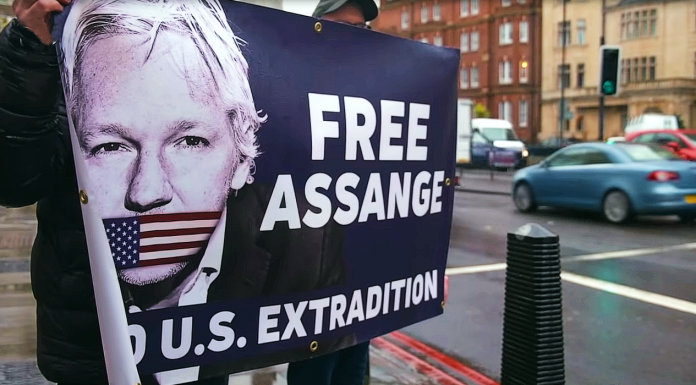(Ken Silva, Headline USA) Journalist James Ball wrote in Rolling Stone Wednesday that Biden’s Justice Department and the FBI are pursing “vague threats and pressure tactics” to pressure British journalists to cooperate with their prosecution of Wikileaks founder Julian Assange.
“I know because I am one of the British journalists being pressured to cooperate in the case against him, as someone who used to (briefly) work and live with him, and who went on to blow the whistle on WikiLeaks’ own ethical lapses,” Ball said.
Assange was charged under the Espionage Act about three years ago for publishing classified information about U.S. war crimes in Iraq and Afghanistan. He’s currently incarcerated in the UK as the DOJ tries to extradite him to America, and while the FBI is reportedly investigating him to possibly bring more charges.
To that end, Ball said the U.S. government’s first approached him in December 2021 about Assange’s relationship with a man called Israel Shamir, whom Ball has written about extensively.
Ball accused Shamir of being a “frequent apologist for Vladimir Putin and his allies,” and said he had access to many of the U.S. state cables later published by Wikileaks. But Ball did not disclose that to the U.S. government when approached, he said. Instead, he remained silent.
“On legal advice, I had stayed quiet about these attempts at the time,” he said. “But now more journalists have told me that police have turned up on their doorsteps, too, in the last month.”
According to Ball, those approached include former Guardian investigations editor David Leigh, transparency campaigner Heather Brooke and the writer Andrew O’Hagan.
As far as pressure tactics go, Ball said his lawyer met with London law enforcement, who accused Ball of living under an assumed name.
“Obviously, we’re working very closely with the Americans on all of this, and the three-letter-agencies [shorthand for the FBI/CIA/NSA etc.], and we’ve got a lot of information at our disposal,” the London police officer told Ball’s attorney. “We thought your client should know that we know ‘James Ball’ doesn’t exist I’m sure there are all sorts of possible legitimate reasons an investigative journalist would use an assumed identity, but it might be helpful for him to be aware we know this.”
Ball said this accusation made him laugh.
“Did the FBI think they had something on me relating to a secret identity?” he wrote on Wednesday.
Ball’s disclosure comes on the heels of an Australian-based reporter making similar claims. The Sydney Morning Herald reported Thursday that the FBI sought to interview novelist Andrew O’Hagan about his time working as a ghostwriter on Assange’s autobiography over a decade ago.
Neither O’Hagan, Ball or any of the other journalists have agreed to cooperate, according to Ball.
Ken Silva is a staff writer at Headline USA. Follow him at twitter.com/jd_cashless.

